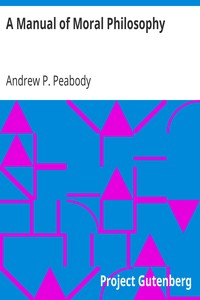A Manual of Moral Philosophy by Andrew P. Peabody
"A Manual of Moral Philosophy" by Andrew P. Peabody is a comprehensive treatise on ethical principles written in the late 19th century. This work is intended primarily for educational use in colleges and high schools, serving as a guide to the foundations of moral philosophy and ethical behavior. It delves into the nature of actions, intentions, and the underlying motivations that drive human behavior, focusing on concepts of right and wrong, duty,
and moral responsibility. The opening of the book introduces the topic of action, explaining that the morality of an action is determined by the intention behind it. Peabody discusses the nature of human will and freedom, contemplating whether true choice exists or if our intentions are influenced by external factors. He argues for the significance of consciousness in our understanding of morality, presenting that our awareness of options and their consequences is fundamental to ethical decision-making. This sets the stage for further exploration of moral philosophy throughout the work, as it aims to provide a systematic framework for understanding moral obligations and the principles that govern human actions. (This is an automatically generated summary.)
Read or download for free
| How to read | Url | Size | |||
|---|---|---|---|---|---|
| Read now! | https://www.gutenberg.org/ebooks/27531.html.images | 480 kB | |||
| EPUB3 (E-readers incl. Send-to-Kindle) | https://www.gutenberg.org/ebooks/27531.epub3.images | 230 kB | |||
| EPUB (older E-readers) | https://www.gutenberg.org/ebooks/27531.epub.images | 236 kB | |||
| https://www.gutenberg.org/files/27531/27531-pdf.pdf | 1010 kB | ||||
| EPUB (no images, older E-readers) | https://www.gutenberg.org/ebooks/27531.epub.noimages | 224 kB | |||
| Kindle | https://www.gutenberg.org/ebooks/27531.kf8.images | 458 kB | |||
| older Kindles | https://www.gutenberg.org/ebooks/27531.kindle.images | 380 kB | |||
| Plain Text UTF-8 | https://www.gutenberg.org/ebooks/27531.txt.utf-8 | 350 kB | |||
| Download HTML (zip) | https://www.gutenberg.org/cache/epub/27531/pg27531-h.zip | 224 kB | |||
| There may be more files related to this item. | |||||
Similar Books
About this eBook
| Author | Peabody, Andrew P. (Andrew Preston), 1811-1893 |
|---|---|
| Title | A Manual of Moral Philosophy |
| Reading Level | Reading ease score: 48.2 (College-level). Difficult to read. |
| Language | English |
| LoC Class | BJ: Philosophy, Psychology, Religion: Ethics, Social usages, Etiquette, Religion |
| Subject | Ethics |
| Category | Text |
| EBook-No. | 27531 |
| Release Date | Dec 14, 2008 |
| Most Recently Updated | Jun 20, 2020 |
| Copyright Status | Public domain in the USA. |
| Downloads | 418 downloads in the last 30 days. |
| Project Gutenberg eBooks are always free! | |

